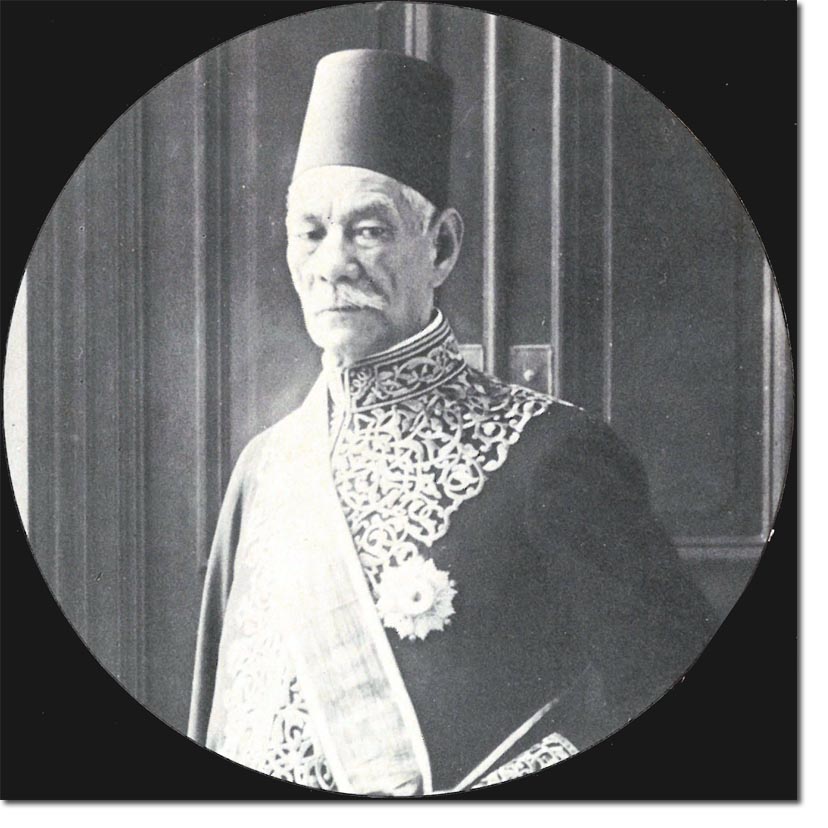|
|


|
|
Saad Zaghlul was from a well-to-do peasant family who married, in 1895, a daughter of Muṣṭafā Pasha Fahmī, the prime minister of Egypt. This opened doors to a political career and earned him some trust from the British. In 1906 he was made head of the newly created Ministry of Education. In 1910, he became minister of justice, a post from which he resigned in 1912 after a disagreement with the khedive Abbās II (Ḥilmī).
World War One brought stresses and strains to the people of Egypt but Zaghlul could claim that he was free from the taint of government or collaboration with the British during this period. On November 13, 1918, two days after the armistice, a delegation (wafd) of three prominent former members of the Legislative Assembly, led by Zaghlūl, called on Sir Reginald Wingate, the high commissioner (as the British representative in Egypt was now called). They informed him that they regarded themselves and not the government as the true representatives of the Egyptian people and demanded that the protectorate be abolished and replaced by a treaty of alliance. They also demanded that they be allowed to proceed to London to negotiate such a treaty directly with the British government. When these demands were refused, widespread disorder broke out, organized through the clandestine bodies set up by Zaghlūl and his associates. In March 1919 Zaghlūl and three of his associates were arrested and deported to Malta, an act that increased the disorder. The British government dismissed Wingate and replaced him with General Edmund Allenby, the wartime conqueror of Palestine. Allenby, faced with the resignation of the government and the prospect of a continuing military campaign to put down a countrywide rebellion, released Zaghlūl and his associates in an attempt to appease Egyptian opinion. Zaghlūl immediately proceeded to Paris, where the Peace Conference was in session, to present Egypt’s case to the Allies. He met with very little success there, but in Egypt he had become a national hero and the master of the situation. Zaghlūl’s release put a temporary end to public disorder in Egypt, and on Allenby’s recommendation, a mission headed by Lord Milner, the British colonial secretary, proceeded to Egypt to make recommendations for the future relationship between the two countries. Zaghlūl, determined that nobody but himself should negotiate with the British, saw to it that the mission was boycotted by all shades of Egyptian opinion. In the summer of 1920 he himself had a series of meetings with Milner in London, at which Milner agreed—unofficially—to the essence of what Zaghlūl himself had demanded of Wingate in November 1918: the substitution of a treaty of alliance for the protectorate. But Zaghlūl had come to fear that any agreement he made with the British would undermine his position in Egypt, which was based on opposition to the British, so he refused to endorse any agreement and returned to Egypt, where he was greeted with wild enthusiasm. The Milner Report, recommending the end of the protectorate and the negotiation of a treaty, was published in February 1921. A government formed by ʿAdlī Pasha Yakan, one of Zaghlūl’s rivals, spent most of the year trying to negotiate such a treaty but was inhibited by Zaghlūl’s virtual veto power. When Adlī consequently resigned, Zaghlūl brought his supporters onto the streets to prevent the formation of any alternative government. Allenby then had Zaghlūl arrested and deported to the Seychelles and prevailed on a reluctant British government to promulgate a unilateral declaration that incorporated the Milner recommendations and conferred a limited measure of independence on Egypt (February 1922). By this time a number of Egyptian politicians, including some of Zaghlūl’s previous supporters, alarmed at the social implications of the agitation that Zaghlūl had released, were prepared to cooperate with the British under the new dispensation. A new party, the Liberal Constitutionalists, was formed and a constitution promulgated. But the forces unleashed by Zaghlūl could not so easily be suppressed, either by his opponents or even by Zaghlūl himself. Zaghlūl was released to take part in the first elections under the new constitution. His party, the Wafd, swept the board, and in January 1924 he became prime minister. In office he showed himself quite unable to control the violent agitation he had set in motion. In November 1924, after a year in which numerous British officials and Egyptian “collaborationists” had been murdered by extremists, the British commander in chief of the Egyptian army was assassinated. After the receipt of what amounted to an ultimatum from Allenby, Zaghlūl resigned. The shock resulting from the violent British reaction rallied the moderates and discouraged the extremists—though, in a general election held in May 1926, the Wafd still held the allegiance of the country. But Zaghlūl, an old man of nearly 70, was no longer eager for office. Under pressure from Lord Lloyd, the new British high commissioner, he agreed to the formation of a coalition government and contented himself with the presidency of the Chamber. In this capacity he succeeded, by and large, in controlling the actions of his more extreme followers until his death. |
Armed Forces | Art and Culture | Articles | Biographies | Colonies | Discussion | Glossary | Home | Library | Links | Map Room | Sources and Media | Science and Technology | Search | Student Zone | Timelines | TV & Film | Wargames